
President Ferdinand Marcos Jr., together with DOTr Secretary Vince Dizon, Bulacan Governor Daniel Fernando, and other officials, inspects the ₱77.1-million flood mitigation structure in Barangay Frances, Calumpit, Bulacan. Mark Balmores, PPA pool/File
Published September 12, 2025
Philippines Creates Independent Panel to Probe Flood Control Corruption
The Philippine government has established an independent commission to investigate widespread allegations of corruption in flood control and infrastructure projects, following mounting public outrage and congressional hearings.
President Ferdinand Marcos Jr. announced the creation of the Independent Commission for Infrastructure (ICI), a three-member body tasked with probing anomalies in flood control spending over the past decade. The panel has the authority to summon government officials, recommend criminal charges, and move to freeze or recover assets linked to questionable projects.
The move comes after weeks of Senate and House investigations that exposed alleged kickback schemes involving lawmakers and officials of the Department of Public Works and Highways (DPWH). Construction contractors Pacifico and Sarah Discaya testified that at least 17 lawmakers demanded up to 25 percent in kickbacks from flood control contracts. In a separate hearing, a former DPWH engineer accused Senators Jinggoy Estrada and Joel Villanueva of receiving 30 percent commissions from specific projects, allegations both senators denied.
Audit findings have also raised questions about the massive scale of spending. Since 2022, more than ₱545 billion (about $9.5 billion) has been allocated to flood control projects, many of which were flagged as substandard, overpriced, or undocumented. Reports revealed that only 15 contractors accounted for nearly 20 percent of the total flood control budget, with several projects showing identical costs across different regions.
The scandal has already led to major shake-ups in the DPWH. The department’s secretary resigned earlier this month and was replaced by Vince Dizon, who ordered the courtesy resignation of senior officials and suspended the bidding process for new locally funded flood control projects.
Civil society groups and business organizations have also demanded transparency and accountability, calling for the full prosecution of officials and contractors involved. A coalition of more than 30 organizations welcomed the independent commission but stressed the need for public disclosure of its findings.
The Senate has vowed to continue its own probe despite the formation of the commission, while the House of Representatives is expected to hold further hearings.
The commission will begin its work immediately, with its mandate covering not only projects under the Marcos administration but also those undertaken during previous governments.
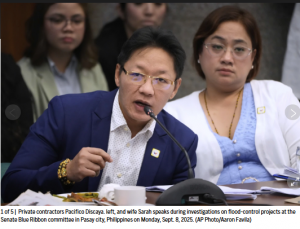
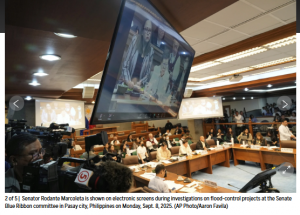
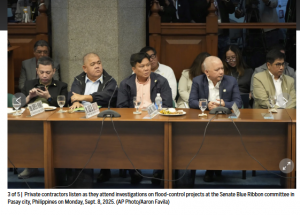
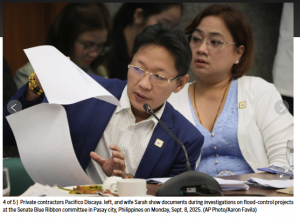
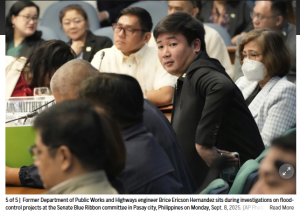
 Implications
Implications
-
Government Accountability & Anti-Corruption Image
-
The Marcos administration’s creation of the independent commission can be framed as a strong, decisive move to enforce accountability, signaling to both domestic and international observers that the government is serious about tackling corruption.
-
From a right-leaning standpoint, this emphasizes law-and-order governance and the importance of institutional reforms, rather than blaming the current administration for past mismanagement.
-
-
Streamlining Bureaucracy and Procurement
-
Findings like concentrated contractor dominance and overpriced projects may highlight inefficiencies in government procurement.
-
Right-leaning narratives may push for smaller government intervention, stricter oversight on public spending, and privatization or public-private partnerships to improve infrastructure delivery.
-
-
Deterring Political Cronyism
-
Allegations against lawmakers and contractors could be used to advocate for stronger legal and political consequences for corrupt officials, supporting a narrative that political patronage should not interfere with merit-based project awards.
-
This aligns with a right-leaning focus on individual accountability and enforcement of rules rather than systemic redistribution arguments.
-
-
Boosting Investor Confidence
-
By cracking down on corruption and ensuring transparency in infrastructure projects, the administration may aim to reassure foreign investors that the Philippines is a safe environment for investment.
-
Right-leaning perspectives typically frame this as essential for economic growth, encouraging private sector involvement in national development.
-
-
National Security Angle
-
Proper flood control and infrastructure projects are crucial for disaster resilience, especially in a country frequently hit by typhoons.
-
Right-leaning narratives may stress that mismanaged projects compromise national security, making anti-corruption measures a matter of protecting citizens and economic stability, not just financial accountability.
-
 Overall Takeaway:
Overall Takeaway:
The creation of the Independent Commission for Infrastructure marks a significant step in addressing allegations of widespread corruption in the country’s flood control and infrastructure projects. With high-level officials and lawmakers under scrutiny, the commission’s work will test the government’s commitment to transparency, accountability, and the proper use of public funds. As the investigation unfolds, all eyes remain on the commission’s ability to restore public trust and ensure that future infrastructure projects serve the Filipino people efficiently and effectively.
SOURCES: THE DIPLOMAT – Philippine president and Congress investigate alleged corruption in flood control projects
ABS-CBN NEWS – Marcos forms 3-member independent body to probe flood control, other infra anomalies in past decade
AP NEWS – Explosive testimony identifies legislators, officials in Philippine flood-control corruption inquiry
REUTERS – Philippine groups demand independent investigation of ‘excessive corruption’ in government projects


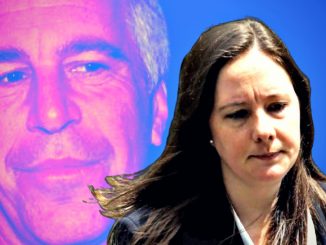


Be the first to comment